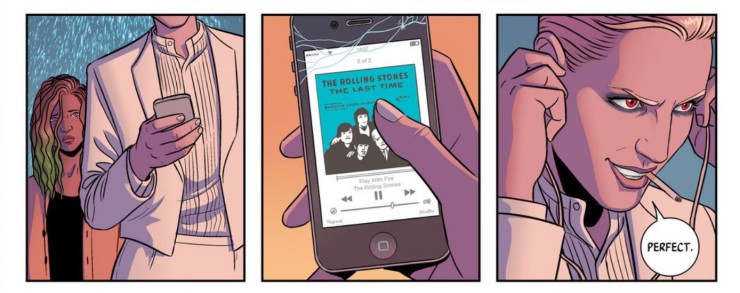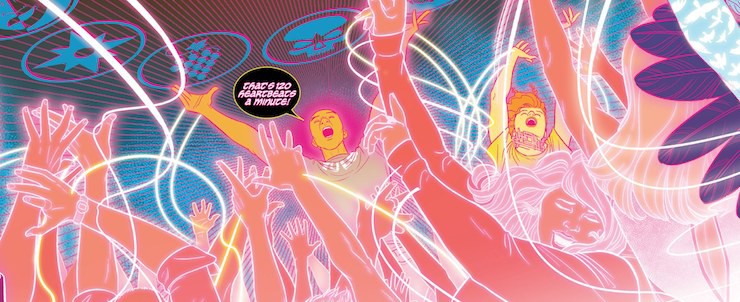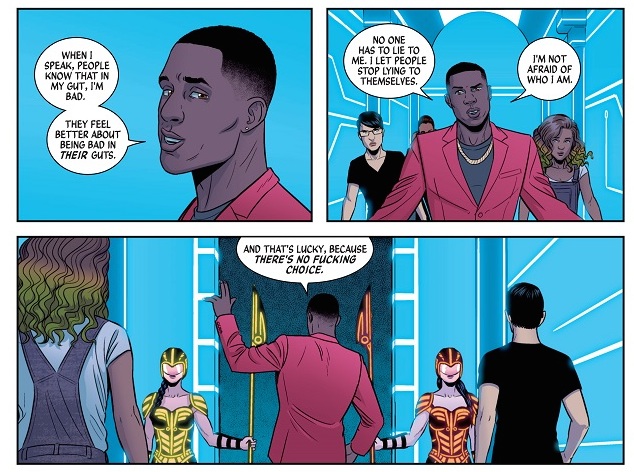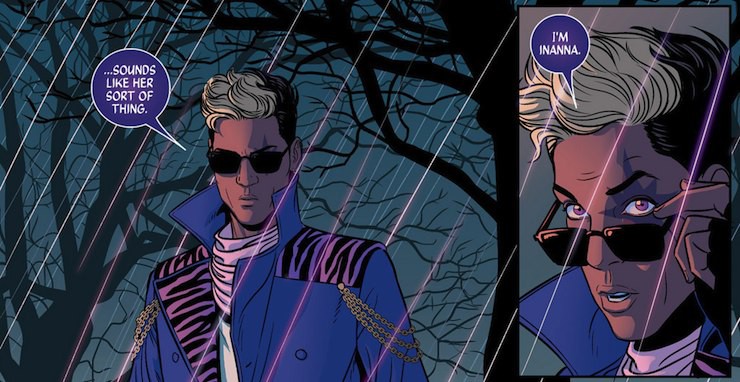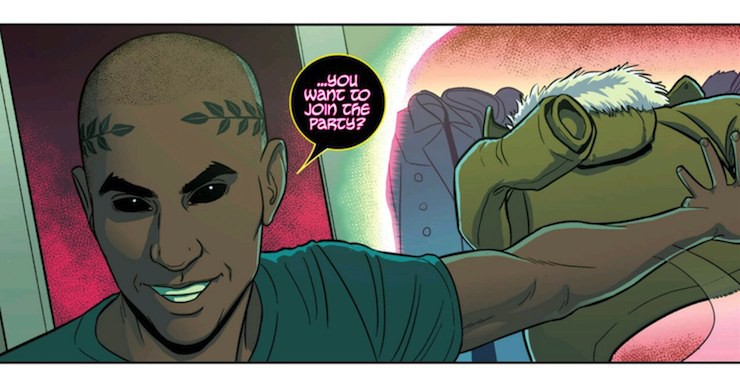Pop Stars are gods. We all know this is true in some way or another—whether in the ecstasy of a song that just “gets” you, or in the frenzied almost-worship of fandom—but The Wicked + The Divine takes that premise a two-step further. In Kieron Gillen and Jamie McKelvie’s comic series, gods from all manner of pantheons are reborn every ninety years as mortal, teenage popsters. They exist to be worshipped, but only for two years. After that, they die, and the phoenix-cycle of creation and destruction begins again.
Like Phonogram before it, WicDiv is a story about music told exclusively through words and images—and the way that the creators make up for the lack of awe-inspiring audio through color and character and pop culture reference is impressive, to say the least. Still, if anything is going to convince you to pick up this phenomenal series, it should be music.
Track 1: “Go!” by Santigold
It will be easy to pinpoint certain pop star archetypes just from looking at the images included here. From Bowie (Lucifer) to Kanye (Baal), Gillen and McKelvie have included a diverse pantheon in more ways than one. When a reporter at NME Music News explained the premise of the story to Florence Welch (including her inspiration of goddess Amaterasu), she reacted with a sort of amazed sympathy. “That makes a lot of sense,” she said.
The recognizability of these characters and the themes that accompany them is helpful in placing readers squarely in the story, but even more than that, they create an instantaneous connection to the tragedy of it all. These are people—kids, at that—and they are living big with the knowledge of death shadowing every note they sing. As a metaphor for fame, you can’t get more ham-fisted, but nor can you get more of an emotional punch.
Track 2: “No Church in the Wild” by Jay-Z & Kanye West
WicDiv is far from a simple meditation on celebrity culture, though.The plot itself follows Laura, a seventeen-year-old fan, as she attempts to infiltrate the world of the gods. Torn between veneration, emulation, and pity, she is the reader’s way into an otherwise unreal world. Her desire to be a part of the pantheon, tampered with a familiar sense of self-deprecation, draws out some of WicDiv’s most potent themes. What would we sacrifice to make something beautiful? Where does creation end and experience begin? And how are we supposed to find meaning in this atonal mess, when we have so little time?
Track 3: “I Wanna Be Adored” by The Stone Roses
Laura’s experience of fandom comes to more of a head in the second collected arc, aptly titled “Fandemonium,” wherein she gains a sort-of-fame in light of her proximity to the pantheon. Unsurprisingly, it’s not at all what she expected or what she wanted. Still, her desire to be like the gods is as strong as ever, and as readers come to know and love the characters behind the archetypes, you can’t really blame her.
We all want to touch gods, we all want to be gods, but even more than that, we all want gods to want us. The line can get a bit fuzzy between creator and audience, and it’s always been that way—if it wasn’t Star Trek fanfiction, it was the Aeneid; if not Beyoncé sampling Major Lazer, it was folk songs carried by mouths and feet, changed past recognition in every town or village they reached. For all our veneration of the Beyoncés and Virgils of the world (and that’s nothing new either), it’s the interaction between us that makes the experience divine.
Track 4: “Grondlandic Edit” by of Montreal
If the amazing characters and compelling story of WicDiv don’t get you, though, the art is bound to do so. McKelvie is best known for his artwork in Young Avengers, and he brings that same vibrancy and emotion to his work here. He and Matthew Wilson (WicDiv’s colourist) give life to music through movement and dance, and through some truly bizarre and startling layouts that I’m hesitant to spoil for new readers, because they’re just that good. At the onset of issue #12, the WicDiv team has expanded to include a host of talented new artists, a prospect that might have made me nervous for any other series. But in a story so rooted in diversity and artistic expression, this expansion can only mean more of a good thing.
Track 5: “Zero” by Yeah Yeah Yeahs
A friend’s reaction when I summarized WicDiv was to say “this sounds like something I’d have dreamt up when I was a teenager”—and, in a lot of ways, it does. WicDiv remixes tropes and pure intentions with a liveliness of vision that makes it more youthful than you’d expect from something so skillfully executed. It also has its finger on the proverbial pulse of fandom, and while fandom certainly isn’t exclusive to the young, it has (in my experience) that all-encompassing, knock-out-drag-out quality that makes your first forays into pop culture so exciting and inviting. WicDiv captures the highs and the lows of that divine experience, and is—perhaps most importantly—fun as hell.
Issues 1 through 15 of The Wicked + The Divine are available from Image comics, as are two compiled trade paperbacks. If you’re interested in more anthems of youth and sanctity, check out writer Kieron Gillen’s ongoing playlist on Spotify. It’s far more extensive than I could be here, and is blessed by the Creator Himself.
Emily Nordling reads, writes, and resides in Chicago, IL.










